O brother where art thou
Now, David Alagna may not be one of the world's great stage directors, but he certainly is among the cutest!
Labels: alagna, guest critic, scandale, youtube

Labels: alagna, guest critic, scandale, youtube
Labels: alagna, guest critic
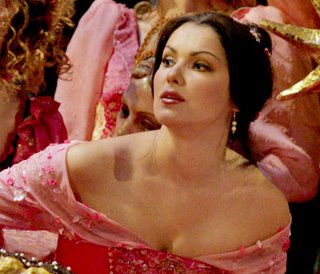 La Cieca should remind herself that much of this accidie springs from opera-l, which most of the time is a valuable resource and all that, but it does seem to be a haven for every tongue-clucking old maid still hunched over her Philco every Saturday afternoon during the broadcast season. (Some of them predate Texaco, La Cieca thinks.) Anyway, the consensus over at opera-l is that Netrebko is kaput, over, finished -- that is, assuming she was ever anything to start with. The Roméo et Juliette has been called "failure" and even (yes!) "debacle." Admittedly , La Cieca occasionally amuses herself by throwing those terms (including the "d" word) around indiscriminately, but she has the defense that nobody with half a brain takes her babbling seriously anyway. On the other hand, La Cieca has her doubts that everybody over at opera-l shares her sense of light-hearted irony in these things.
La Cieca should remind herself that much of this accidie springs from opera-l, which most of the time is a valuable resource and all that, but it does seem to be a haven for every tongue-clucking old maid still hunched over her Philco every Saturday afternoon during the broadcast season. (Some of them predate Texaco, La Cieca thinks.) Anyway, the consensus over at opera-l is that Netrebko is kaput, over, finished -- that is, assuming she was ever anything to start with. The Roméo et Juliette has been called "failure" and even (yes!) "debacle." Admittedly , La Cieca occasionally amuses herself by throwing those terms (including the "d" word) around indiscriminately, but she has the defense that nobody with half a brain takes her babbling seriously anyway. On the other hand, La Cieca has her doubts that everybody over at opera-l shares her sense of light-hearted irony in these things.Labels: alagna, domingo, met, netrebko, rant, scandale, sirius
Labels: 2009, 2010, alagna, gheorghiu, jonas kaufmann, levine, met, scandale
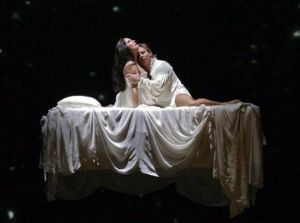 Of course, cher public, you heard it about it here a few weeks ago, but La Cieca has just read a press release from the Met announcing that, yes indeed, Roberto Alagna will reprise his Roméo opposite Anna Netrebko on December 12 and 15. (Our Own Gualtier Maldè, as you no doubt recall, confirmed the rumor when he spoke to Alagna after Aida on Tuesday night.) The December 15 matinee of Roméo et Juliette is the first of this season's "Live in High Definition" transmissions to movie theaters around the world.
Of course, cher public, you heard it about it here a few weeks ago, but La Cieca has just read a press release from the Met announcing that, yes indeed, Roberto Alagna will reprise his Roméo opposite Anna Netrebko on December 12 and 15. (Our Own Gualtier Maldè, as you no doubt recall, confirmed the rumor when he spoke to Alagna after Aida on Tuesday night.) The December 15 matinee of Roméo et Juliette is the first of this season's "Live in High Definition" transmissions to movie theaters around the world.Labels: 2007, alagna, gualtier malde, la cieca ci guarda la cieca ci vede, met, netrebko, our own, telecast
Verdi has a way of testing his singers at the opening curtain. (See also "La Traviata," Act I, Scene 1.)
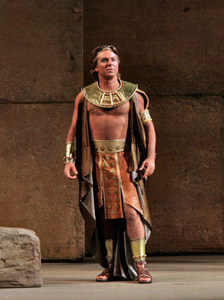 So, was last night a triumph or a disaster? Well, it was neither since the role of Radames doesn't play to all of Roberto Alagna
So, was last night a triumph or a disaster? Well, it was neither since the role of Radames doesn't play to all of Roberto AlagnaLabels: alagna, gualtier malde, met, review
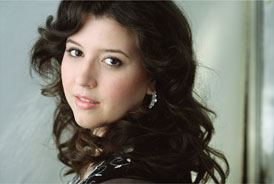 La Cieca predicted a cast change earlier, and what do you know, so it came to pass! Soprano Lisette Oropesa will sing the Tuesday prima of the Met's revival of Le nozze di Figaro and at least one more performance. She is jumping in for the enceinte Isabel Bayrakdarian. Ms. Oropesa is not only a member of the Met's Lindemann Young Artist Development Program but (even more impressively) she is La Cieca's homegirl since she is a graduate of LSU in dear old Baton Rouge! It should be noted, however, that she and La Cieca matriculated in different centuries.
La Cieca predicted a cast change earlier, and what do you know, so it came to pass! Soprano Lisette Oropesa will sing the Tuesday prima of the Met's revival of Le nozze di Figaro and at least one more performance. She is jumping in for the enceinte Isabel Bayrakdarian. Ms. Oropesa is not only a member of the Met's Lindemann Young Artist Development Program but (even more impressively) she is La Cieca's homegirl since she is a graduate of LSU in dear old Baton Rouge! It should be noted, however, that she and La Cieca matriculated in different centuries.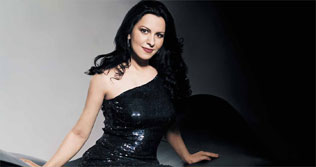 Meanwhile, in Chicago, Angela Gheorghiu has been fired from Lyric Opera's production of La bohème which is scheduled to open Monday, October 1. Thundered General Director William Mason, "Miss Gheorghiu has missed 6 of 10 rehearsals, including the piano dress rehearsal and both staging rehearsals with the orchestra. She missed one of the most critical stage-orchestra rehearsals when she left the city for New York without permission, a direct violation of her contract." La Gheorghiu was in fact spotted in the audience for the Met's prima of Gounod's Roméo et Juliette on Tuesday night.
Meanwhile, in Chicago, Angela Gheorghiu has been fired from Lyric Opera's production of La bohème which is scheduled to open Monday, October 1. Thundered General Director William Mason, "Miss Gheorghiu has missed 6 of 10 rehearsals, including the piano dress rehearsal and both staging rehearsals with the orchestra. She missed one of the most critical stage-orchestra rehearsals when she left the city for New York without permission, a direct violation of her contract." La Gheorghiu was in fact spotted in the audience for the Met's prima of Gounod's Roméo et Juliette on Tuesday night.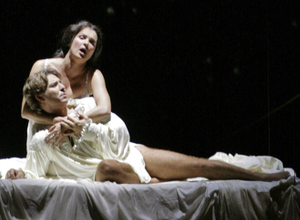 The news is somewhat less dire for other members of the Gheorghiu famille. Those of you cher public who missed out on Roberto "Million Dollar Legs" Alagna's stylish Roméo this week may get another chance at seeing his collaboration with Anna Netrebko in the Gounod love story. La Cieca hears that Alagna will return in December to fill the "TBA" slots on the 8th, 12th and 15th, including the broadcast and HD telecast. Matthew Polenzani, La Cieca hears, will take over the role on December 20.
The news is somewhat less dire for other members of the Gheorghiu famille. Those of you cher public who missed out on Roberto "Million Dollar Legs" Alagna's stylish Roméo this week may get another chance at seeing his collaboration with Anna Netrebko in the Gounod love story. La Cieca hears that Alagna will return in December to fill the "TBA" slots on the 8th, 12th and 15th, including the broadcast and HD telecast. Matthew Polenzani, La Cieca hears, will take over the role on December 20.Labels: alagna, cher public, chicago, la cieca ci guarda la cieca ci vede, met
Labels: alagna, la cieca ci guarda la cieca ci vede, met, villazon
Labels: alagna, domingo, first emperor, gelb, levine, met, midgette, mortier, nyco
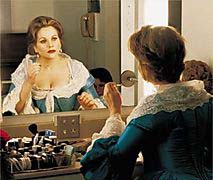 You may well be surprised to hear La Cieca say this, cher public, but she's bellowing a lusty "brava" to none other than Renee Fleming. On yesterday's matinee Met broadcast of Rigoletto, Fleming took on a role associated with Geraldine Farrar, that of intermission commentatress. One of the first questions she lobbed at Joseph Calleja (Duca in the performance) was his opinion on the Roberto Alagna brouhaha. Calleja sensibly non-committed, but Fleming spoke eloquently off the cuff, essentially becoming the first member of the opera establishment to defend the "walkout" tenor.
You may well be surprised to hear La Cieca say this, cher public, but she's bellowing a lusty "brava" to none other than Renee Fleming. On yesterday's matinee Met broadcast of Rigoletto, Fleming took on a role associated with Geraldine Farrar, that of intermission commentatress. One of the first questions she lobbed at Joseph Calleja (Duca in the performance) was his opinion on the Roberto Alagna brouhaha. Calleja sensibly non-committed, but Fleming spoke eloquently off the cuff, essentially becoming the first member of the opera establishment to defend the "walkout" tenor.Labels: alagna, cher public, fleming, met
FZ: Calm down. The gong rang. The fight's over.
RA: I will not calm down! And I will not be plotted against! Such nonsense, what do you all take me for -- little Nello from the country? Been my understudy for over a week without my knowing, shows up when everyone knew I'd be here, and gives a performance! Out of nowhere -- gives a performance!
FZ: You've been all through that with Lissner...
RA: Full of fire and music and what-not, carefully rehearsed I have no doubt, full of those Franco Zeffirelli touches!
FZ: I am sick and tired of these paranoiac outbursts! I didn't even know Antonello Palombi was your understudy until half past two this afternoon!
RA: Tell that to Dr. Lombroso, along with the rest of it!
FZ: No, I'll tell it to you! For the last time, I'll tell it to you! You're a beautiful and intelligent artist...
RA: A body with a voice!
FZ: Well, perhaps not the voice for Radames. You have every reason for happiness, but due to some strange, uncontrollable, unconscious drive you permit the slightest action of a ragazzo...
RA: Ragazzo!
FZ: Ragazzo like Antonello to turn you into a hysterical screaming divo! Now once and for all, stop it!
RA: It's obvious you're not a tenor.
FZ: I've been aware of that for some time.
RA: Well, I am.
FZ: I'll say. Now come on Roberto, let's get out of here. I'll buy you a drink.
RA: I'll admit I may have seen better days, but I am still not to be had for the price of a cocktail like a bruschetta.
Labels: alagna
In the words of dear Alex Ross, "I'm no Zapruder," but La Cieca does note certain subtleties:
Now, what, if anything, does all this mean? Well, the first two changes would seem to suggest that someone decided to try to avoid "killing" Alagna's applause after his aria. The quiet ending, plus the presence of another character moving onstage) would tend to put a damper on audience reaction. La Cieca's guess is that Alagna was not happy with the polite applause at the prima and so tried to (as one might say) "give the public a chance to express their admiration." The video thus gives impression that Alagna was going a little mild milking of the applause. The well-timed "bravo" might be an attempt by a fan to build the ovation. Now, going further out into the realm of speculation, perhaps the ensuing "boo" was a scornful reaction to the "bravo" rather than a jeer at Alagna's performance per se.
Here's where it gets particularly interesting, at least to La Cieca's fevered imagination. A feature of these La Scala shouting matches is that the exclamations used are both wildly inflammatory and dangerously ambiguous. We are told that shouts were heard of "Vergogna, vergogna!" and "Questa e la Scala!" But to whom were these cries addressed, and in reaction to what? Were they saying, "shame, shame" to Alagna because his singing (in their opinion) was below La Scala standard? Or was the "shameful" part his perceived disrespect (or cowardice?) in walking offstage just because of a mixed reaction from the public. ("This is La Scala, get used to it!")
Or maybe the yelling was mostly, as we might say, intramural; i.e., various members of the audience yelling at each other, in which case Alagna's walk was really a gross overreaction.
But, speaking of the "walk" issue, I think this video takes some of the heat off Riccardo Chailly. When he starts the Amneris music, Alagna is still onstage. All Chailly can see at that moment is that the tenor is not doing the staging he was taught, which is not exactly unprecedented in Italian opera. For all Chailly could see, it may have appeared that Alagna was just stepping into the wings for a moment to clear his throat or grab a gulp of water -- again, these things do happen.
Had Antonello Palombi not bounded on from the wings, presumably Chailly would have stopped the orchestra, the curtain would have been lowered, and the performance would have continued with Walter Fraccaro, perhaps following a brief announcement. Where La Cieca is going with this is that it doesn't look like Chailly was necessarily conspiring against Alagna along with the three mysterious karate men, the anonymous phone caller and all the other members of the anti-Alagna faction.
Meanwhile, the latest installment of Opera Chic whispers that Stéphane Lissner has given orders to the Scala staff: if Alagna attempts to enter the theater, call the police! In contrast to such hysteria, Riccardo Muti spoke to La Stampa Daily, turning aside questions about Alagna's behavior but sniping at the "moronic" stage production by Franco Zeffirelli.
 Well, it had to happen sooner or later, and so it did happen, sometime between last night and tonight. La Cieca has decided she's taking Roberto Alagna's side in The Scandale.
Well, it had to happen sooner or later, and so it did happen, sometime between last night and tonight. La Cieca has decided she's taking Roberto Alagna's side in The Scandale.Labels: aida, alagna, callas, cher public, fleming, gala, met, youtube
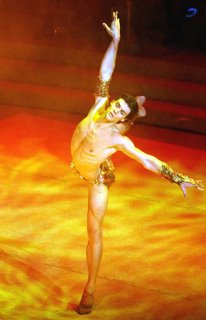
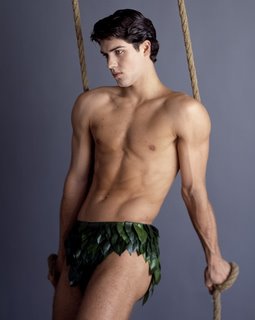
 Your correspondent is back in town just in time to report that Roberto Alagna walked out of tonight's performance of Aida at La Scala when his rendition of "Celeste Aida" was greeted by "qualche fischio" among the polite applause. The Corriere della Sera reports that Antonello Palombi was rushed onto the stage in "black jeans and t-shirt" to complete the act, but not before the audience cried, "vergogna, vergogna!" and "questa è la Scala!"
Your correspondent is back in town just in time to report that Roberto Alagna walked out of tonight's performance of Aida at La Scala when his rendition of "Celeste Aida" was greeted by "qualche fischio" among the polite applause. The Corriere della Sera reports that Antonello Palombi was rushed onto the stage in "black jeans and t-shirt" to complete the act, but not before the audience cried, "vergogna, vergogna!" and "questa è la Scala!"
Why the distance between the once-inseparable team? Don't go blaming Sir Terry Wogan! But could it have something to do with the unbilled appearance of "hunky Romanian pop singer/actor" Stefan Banica Jr.?
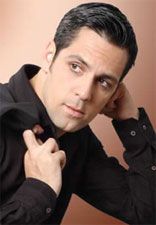
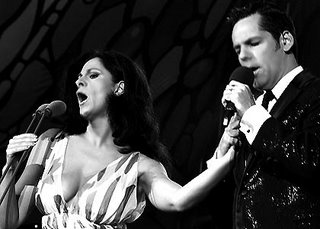
Alas, the afternoon portion of the concert was not broadcast, so you'll just have to use your mind's ear to imagine the performances of "Madness tribute band One Step Behind, irrepressible cockney duo Chas & Dave, and poptastic singer Chico."
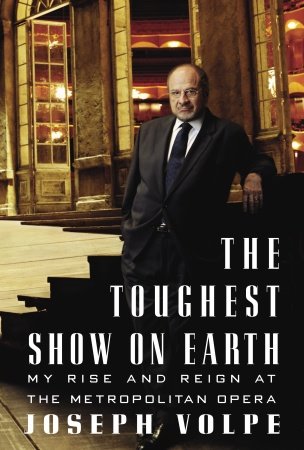 Volpe's rise from middle management to top dog (when he finally claimed Bing's old office) hinged on a series of coincidences. First came the death of intendant-to-be Goeran Gentele, leaving a lacuna hastily plugged with the semi-competent Schuyler Chapin, first of several weakish General Managers who allowed Bing's centralized power to dissipate. Meanwhile, Rafael Kubelik deserted the newly-created post of Music Director, sweeping the young James Levine into power. Volpe found himself allied with the volatile new Director of Productions John Dexter, who relied on Volpe to get things done in the notoriously entropic Met bureaucracy.
Volpe's rise from middle management to top dog (when he finally claimed Bing's old office) hinged on a series of coincidences. First came the death of intendant-to-be Goeran Gentele, leaving a lacuna hastily plugged with the semi-competent Schuyler Chapin, first of several weakish General Managers who allowed Bing's centralized power to dissipate. Meanwhile, Rafael Kubelik deserted the newly-created post of Music Director, sweeping the young James Levine into power. Volpe found himself allied with the volatile new Director of Productions John Dexter, who relied on Volpe to get things done in the notoriously entropic Met bureaucracy.hated the flat silver walls that Dexter and the designer, David Reppa came up with [for a production of Don Carlo], but she bided her time until after Dexter left the Met. Once he did, the scenery department, at her insistence, redid the walls with an elaborate pattern more in keeping with King Philip's -- and her -- taste.Volpe also allowed a more notorious benefactor to dictate that the booking operator at the Met's onsite restaurant answer the phone with, "Good afternoon, Vilar Grand Tier Restaurant," as if seeing the "V" word stenciled all over the walls wasn't enough. Volpe insists that he and Alberto Vilar "had little personal contact," and with crystal clear hindsight, notes that Vilar "always seemed to be harboring secrets . . . . I wondered when all this would go up in smoke." But he didn't let that stop him from allowing Vilar to act as if he ran the place.
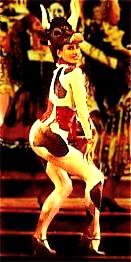 La Cieca has just learned the scheduled roster and repertoire for the Volpe Farewell Gala to be performed on Saturday, May 20 (and, if all this music stays in the show, part of May 21 as well.) Deborah Voigt will open the program with special material by Ben Moore, accompanied by Brian Zeger. The first of the James Levine stand-ins, Valery Gergiev, will then conduct selections from Ruslan and Ludmilla and Tannhaeuser. (Further baton duties for the evening are shared among Marco Armiliato, James Conlon, Plácido Domingo, Peter Schneider and Patrick Summers.)
La Cieca has just learned the scheduled roster and repertoire for the Volpe Farewell Gala to be performed on Saturday, May 20 (and, if all this music stays in the show, part of May 21 as well.) Deborah Voigt will open the program with special material by Ben Moore, accompanied by Brian Zeger. The first of the James Levine stand-ins, Valery Gergiev, will then conduct selections from Ruslan and Ludmilla and Tannhaeuser. (Further baton duties for the evening are shared among Marco Armiliato, James Conlon, Plácido Domingo, Peter Schneider and Patrick Summers.)Labels: alagna, dessay, fleming, florez, gala, gelb, giordani, levine, met, nyco, pav, voigt
Roberto Alagna . . . sta male a causa di crisi ipoglicemiche e non potrà cantare per almeno tre mesi . . . . A dare la notizia lo stesso cantante accompagnato dalla moglie, il soprano Angela Gheorghiu, che ha annullato i suoi appuntamenti in giro per il mondo per i prossimi mesi pur di stargli vicino.
UPDATE: January 14 . . . A veteran diva close to Gheorghiu says this morning, "Angela will sing the Traviatas."
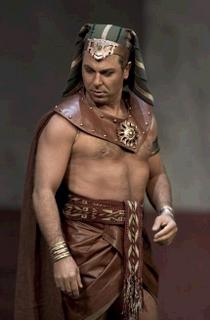
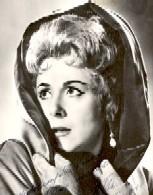 La Cieca notices that those lovely people over at Berkshire Record Outlet are offering what might fairly be called a plethora of opera performances on DVD, for just $8.99 a pop. Particularly drool-inducing selections include La Grande-Duchesse de Gerolstein (Regine Crespin), Lakme (Joan Sutherland), Carmen (Denyce Graves, Roberto Alagna), Un ballo in maschera (Carlo Bergonzi, Antonietta Stella), Norma (Montserrat Caballe, Tatiana Troyanos), Faust (Alfredo Kraus, Renata Scotto, Nicolai Ghiaurov) -- and even a 1988(!) La Gioconda starring Grace Bumbry and Fiorenza Cossotto! Now, you all know how quickly great stuff like this sells out at Berkshire, so what are you waiting for? Get over there now!
La Cieca notices that those lovely people over at Berkshire Record Outlet are offering what might fairly be called a plethora of opera performances on DVD, for just $8.99 a pop. Particularly drool-inducing selections include La Grande-Duchesse de Gerolstein (Regine Crespin), Lakme (Joan Sutherland), Carmen (Denyce Graves, Roberto Alagna), Un ballo in maschera (Carlo Bergonzi, Antonietta Stella), Norma (Montserrat Caballe, Tatiana Troyanos), Faust (Alfredo Kraus, Renata Scotto, Nicolai Ghiaurov) -- and even a 1988(!) La Gioconda starring Grace Bumbry and Fiorenza Cossotto! Now, you all know how quickly great stuff like this sells out at Berkshire, so what are you waiting for? Get over there now!